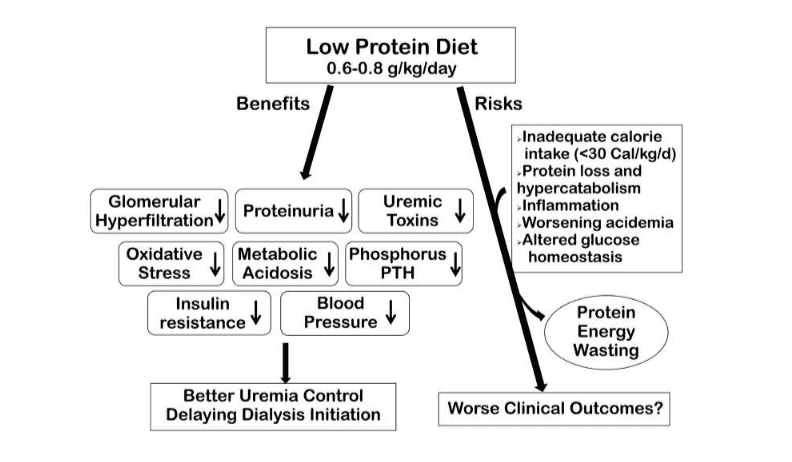Proteins play the most crucial role in our kidney and health. Without proteins, our body would be unable to develop and maintain the muscular strength required for normal body functioning. Without proteins, our body would be unable to heal from injuries or fight foreign bodies or infections. Therefore eating protein is so important to staying healthy. A healthy person’s protein requirements vary from 40 to 65 grams daily.
What should I eat? How much should it be? When should I eat? etc. are the most frequent queries we receive from kidney patients diagnosed with Kidney Failure. It is obvious that it can be puzzling when you hear or read different things on social media, the internet, etc.

The kidneys have a vital function to perform. Kidneys are involved in the metabolism of amino acids and proteins and the breakdown and excretion of protein metabolites. This foreshadows the significant influence dietary protein consumption will have on metabolic processes regulated by the kidney as well as on kidney functions. These days most health-conscious people are switching their diet to high-protein diets. But, a high-protein diet may harm the kidneys and promote the buildup of toxic protein metabolites.
In contrast, a low-protein diet (LPD) has several medical advantages for those with renal insufficiency. The usefulness of LPD in managing Kidney Failure, however, continues to attract varying amounts of interest and effort. Here in this article, we would like to shed light on why dietary protein restriction should be practised, how reduced protein intake may increase kidney longevity, and why high dietary protein intake may injure the kidney in renal patients.

Renal or kidney diets are designed to reduce the quantity of waste products carried in the blood and the work the kidneys must perform. The main components of concern in a renal diet are proteins, salts, potassium, and phosphorus. Hopefully, the information in the following blog posts on general dietary recommendations for kidney failure patients may provide an answer.
Impact of Proteins on Kidney Function
Your body’s filters are your kidneys. Your kidneys can get permanently harmed if you are a kidney patient and are eating too much protein. Your weight, urine protein findings, diabetes, your nutritional state, and the stage of your kidney disease all affect how much protein you need. Eating less protein becomes crucial if tests reveal you have proteinuria, high blood urea levels (azotemia), or both or if either condition is present alone.
Plant-based sources, such as beans, legumes, and tofu, and animal sources, such as beef, pork, chicken, eggs, fish, shellfish, and dairy products, are protein sources. On a low-protein diet, protein powder supplements are not advised because they are often manufactured from soy or whey.

Any stage of chronic kidney disease (CKD) results in a loss of the ability to eliminate nitrogenous protein waste from food and drink, which causes it to accumulate in the blood. Uremia is the term used for this. You can experience nausea, a sour taste in the mouth, appetite loss, and weakness due to uremia. The progression of renal disease can be slowed down by eating less protein if you have stages 1 or 2 of the disease (GFR of 60 or above).
The current advice is to keep dietary protein intake for people with CKD stages 1 and 2 to 0.8 grams per kilogram of ideal body weight. For instance, if your ideal weight is 150 lbs, or 68 kg, your daily protein requirements are 68 kg x 0.8 g/kg, or 54 grams. Including more plant-based proteins is preferable when your glomerular filtration rate (GFR) begins to decrease since the breakdown of animal proteins produces less urea. It is always suggested to consult a renal dietitian to find the right amount and type of proteins for you.
You need to reduce your protein intake even more if you have entered the CKD stages 3-5; your GFR is 59 or lower. A few studies recommend limiting proteins to less than 0.55-0.60 grams per kg of your body weight; it would delay the further decline in your kidney function.
How Ayurveda Helps Kidney Failure Patients?
These days high protein diets are extremely popular for weight loss and type 2 diabetes. But there is evidence that suggests that worsening of renal functions may occur in individuals with or without impaired renal function. A diet with a high amount of proteins can cause intraglomerular hypertension. This may further result in kidney hyper-filtration, glomerular injury, and proteinuria infection. It is also suggested that long-term high protein intake may develop de novo CKD.

Protein quality also plays an important role in kidney health. It has been seen that when compared with plant-based protein sources, animal proteins are associated with an increased risk of ESKD.
Protein is also found in limited amounts in starchy foods and grains. These amounts are accounted for as well. In the case of kidney diseases, if you limit your proteins, you still need to eat enough calories from other food groups to spare proteins and further prevent weight loss and muscle wasting.
Kidney Failure Treatment in Ayurveda is inclusive of appropriate therapeutic interventions. There is no mention of Kidney Failure in Ayurveda, but based on pathogenesis, management of the disease is planned.
The detection and management of the primary cause are essential for kidney failure. The contemporary system costs are high for patients. Hence, there arises a need to establish affordable medical care with no side effects. Ayurveda is available here to help with sustainable remedial measures. Vata dosha is mostly considered the causative factor collaborating with Pitta and Kapha, as per Ayurveda, for all urine-related disorders. Hence a personalised treatment (Kidney failure treatment in Ayurveda) is planned considering the Doshas and the diseases.
Ayurveda treatment includes using regenerative herbs under Rasayana Chikitsa, which helps regenerate nephrons. It also suggests a diet that would provide a minimum load to the kidneys.
Herbs like ‘Punarnava,’ ‘Gokhuru,’ and ‘Varuna’ are always found to be life saviors for patients with Ayurvedic treatment for kidney disease.

